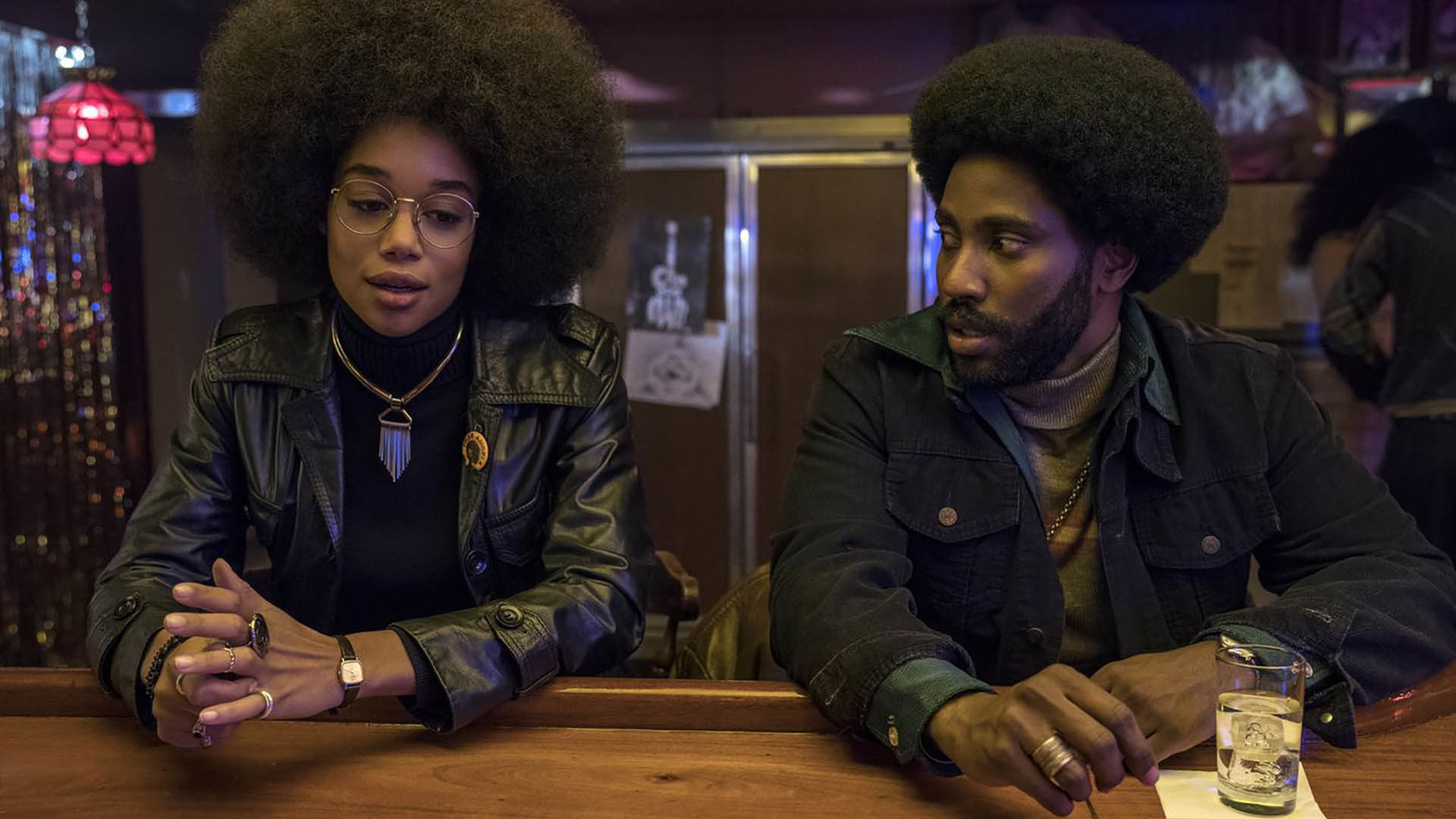In this current political and social era, when segments of our traumatized culture are doubling down on the belief that there is not enough for everyone, that the thriving of one must come at the expense of another, we hold a deep need for stories that speak truth to power and dare to offer another narrative. In that light, our President, Dr. Craig Detweiler, whose career in filmmaking, writing, and teaching has explored the intersections of theology and culture, offers this review of Spike Lee’s new film BlacKkKlansman—an energizing dive into not-so-distant history that has much to say about our current climate. This review also appears over at Patheos.com.
Last summer, Get Out took us inside the sunken place that paralyzes those caught in a spiral of racism. Now, BlacKkKlansman exposes the unholy marriage of white nationalism and Christianity which motivates cross burnings and lynchings, excuses police shootings, and justifies racist dog whistles. BlacKkKlansman is an enormously entertaining mix—equal parts comedy and crime drama, cinematic valentine and potent agit-pop. It is a fierce exploration of the past that we need NOW.
BlacKkKlansman was originally slated to be directed by Jordan Peele following his Oscar-nominated helming of Get Out. Instead, it became a chance for elder statesman, 61-year-old Spike Lee to show the rising young director how it is done. Lee draws upon 30 years of cinematic mastery [which includes Do the Right Thing (1989), Malcolm X (1992), and Bamboozled (2000)] to connect this strange but true ‘70s story to contemporary parallels. Denzel Washington’s son, John David Washington distinguishes himself as Ron Stallworth, the first African-American on the Colorado Springs police force. He stares through those who refuse to recognize his intelligence, uncovering racist cops and KKK members lurking in the Rocky Mountains.
The film works as a cracker jack police procedural about an undercover brother. Assigned to investigate Kwame Ture’s call for black power, Ron instead delves into the white hatred, fear, and violence which predicates the need for black pride and self-determination. Spike Lee places Ron’s self-awakening amidst a sea of beatific black faces listening to Ture’s speech at Colorado College. Ron’s efforts to come alongside the passionate leader of the Black Student Union, Patrice (played by Laura Harrier with strong echoes of Angela Davis), leads to both dramatic and romantic complications.
BlacKkKlansman also provides plenty of comedic delights. The set-up echoes Cyrano de Bergerac, as Ron talks to the KKK on the phone but obviously needs another detective to portray him in person to the Klan. Flip Zimmerman (a compelling Adam Driver) is assigned to the investigation. Ron is so effective at speaking the king’s English that he eventually dupes Grand Wizard David Duke (an almost unrecognizable Topher Grace) into fast tracking his application to join ‘the organization.’ The same comedic exploration of code switching was employed earlier this summer in the even more subversive Sorry to Bother You. While we laugh at Ron’s ability to outsmart the Klan members, we also recognize the serious danger that his partner, Flip, encounters as he is initiated into the KKK. We realize that those who become allies also end up with skin in the game. Comedy can quickly turn toward tragedy.
This delicious mix of comedy, drama, romance, and even documentary is appropriate for the mixed-up world we’re all navigating. Spike Lee’s kitchen-sink surrealism aligns with our time when satire cannot possibly contain the costly foolishness and dangerous demagoguery dominating our political discourse. It is not subtle. It is appropriately strong. BlacKkKlansman turns back the clock to expose how we got to a present where blatant racism works as an effective campaign strategy. We may be tempted to laugh at the buffoonery of David Duke and his minions, but they have infected significant sectors of our society (who will not be watching this movie). The grandiose score by Terence Blanchard underscores the gravity of the proceedings and how rooted they are in American history. This is who we were and, tragically, who we still are.
“BlacKkKlansman turns back the clock to expose how we got to a present where blatant racism works as an effective campaign strategy.”
BlacKkKlansman also explores how movies can motivate love or hate. It gets the swinging Soul Train ‘70s era so right—from the clothing, to the hairstyles, through the groovin’ tunes. It revels in blaxploitation movies and heroes like Richard Roundtree in Shaft and Pam Grier as Coffy. It lovingly evokes the era it portrays. But Spike Lee also critiques the role of media—specifically movies—in stirring up hatred. He demonstrates how the mythologizing scale of big screen spectacle in Gone With the Wind made the Old South look like the noble victim in “the War of Northern Aggression.” While the Klan members seek to cast themselves as the heroes in The Birth of a Nation, Spike Lee makes them the bug-eyed fools. In a brilliant sequence of cross cutting, Lee shows how education (and/or indoctrination) works in two distinct settings. While the Klan don hoods and take up torches, black students respond by raising a fist and marching on behalf of lynching victims. Two tribes with two distinct initiation rituals.
The understated third group explored in the film is the police force. BlacKkKlansman is a surprising affirmation of good cops doing their job. As Ron draws closer to Patrice, he also challenges her to not dismiss all officers as racists. He works inside a system that she dismisses as unredeemable. Can his undercover operation protect and serve a community that views the police with justifiable skepticism? BlacKkKlansman builds towards a nail-bitingly suspenseful climax. Will justice prevail or racism reign?
BlacKkKlansman offers devastating parallels for how we got here. It shows how the rise of black power is met by white fear, especially by those who view life as a zero-sum game. The Klan cannot imagine a world in which all prosper and live in peace. For white nationalists, “Your gain comes at my expense.” “America First” is a call to battle in which only one race can win. BlacKkKlansman traces how the dog whistles initiated in white supremacist groups led by David Duke have been mainstreamed and adopted by our current president to motivate far too much of his political base. The film arises from the same prophetic impulse that drove Martin Luther King to address “the fierce urgency of now.”
Why did BlacKkKlansman open this August weekend? Because one year ago, Heather Heyer’s blood spilled on the streets of Charlottesville called us all to some kind of activism. We must bemoan racism—so obvious in its ugliness. But we also must actively expose any attempt to wrap the cross in anything other than a common brokenness, an aching need for restoration that cuts across all races, cultures, languages, tribes. For those who have eyes to see and ears to hear, BlacKkKlansman is a bracing call to choose sides, to do the right thing, to join heroes like Ron Stallworth, to become allies like Flip Zimmerman. The twisted merging of Christian signs and symbols with white nationalism must be denounced at every juncture, especially NOW.


